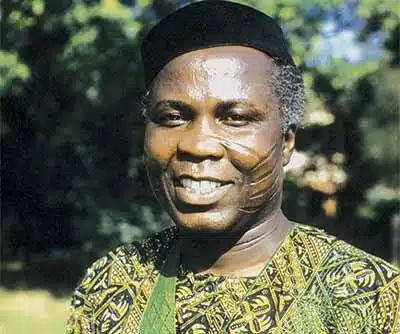Samuel Ladoke Akintola was born on July 10, 1910, into the famous Akintola Akinbola family of Ogbomoso which hailed from Oba Olugbon of Igbon royal family.
His father was Solomon Akintola Akintola while his mother was princess Omolade Akanke Akintola, daughter of Oba Oyeniya, another royal lineage of Onpetu stool, Ògbómòsó.
Shortly after his birth, Young Ladoke Akintola followed his father to Minna, Gusua, Zaria, Kano, and Bornu, and to Chad, and Niger as his father had become an international literate trader in potash.
For primary education, Samuel Ladoke Akintola attended Baptist Day School, Osupa, Ògbómòsó and thereafter entered Baptist College and Seminary, Ògbómòsó in his home town, to receive training as a teacher and as a preacher of the gospel of Christ as it was a popular practice in those days.
Upon completion of training as a brilliant young man, he was given the rare privilege to teach at Baptist Academy, Lagos until 1946 when he proceeded to England on a scholarship award by British Council to study Diploma in Administration and Journalism at Barnel House, Oxford in Great Britain.

In 1947, he enrolled at the Inn of Court in London and was called to the English Bar (B.L) in 1949. In March 1950, he came back to Nigeria as a qualified Solicitor and Advocate of the Supreme Court of Nigeria.
It is even said that by the time he completed his schooling, he had finished reading the complete works of Shakespeare and some other Poets.
Samuel Ladoke Akintola: A Political Gladiator
On the firmament of Nigeria’s landscape, he became the secretary of Nigeria’s first-ever political Association – the Nigerian Youth Movement, and became the Editor of the Daily Service newspaper, and through this job, his admirers began to call him SLA.
In 1953 under Sir John Macpherson, he became the federal (Central) minister of labour, in which he encouraged close cooperation between Management and labour.
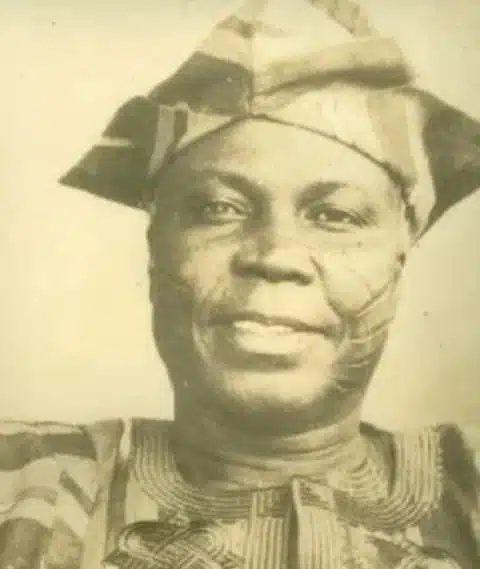
And similarly, as the (first) Minister Of Health and Social Welfare, Chief (Hon.) S.L.A. was associated with the building and opening of the first Teaching University College Hospital, Ibadan in 1954, he was also the first Minister of Communication and Aviation.
He later became a leader of the opposition in the Federal Parliament after being elected from the Osun division into the House of Representatives.
As the leader of the opposition, he instructed all delegates to the constitutional conference of 1957 to secure the grant of self-government to the federation of Nigeria in 1959.
On this basis whether anybody likes it or not, Chief S.L Akintola remains one of the architects of Nigeria’s freedom.
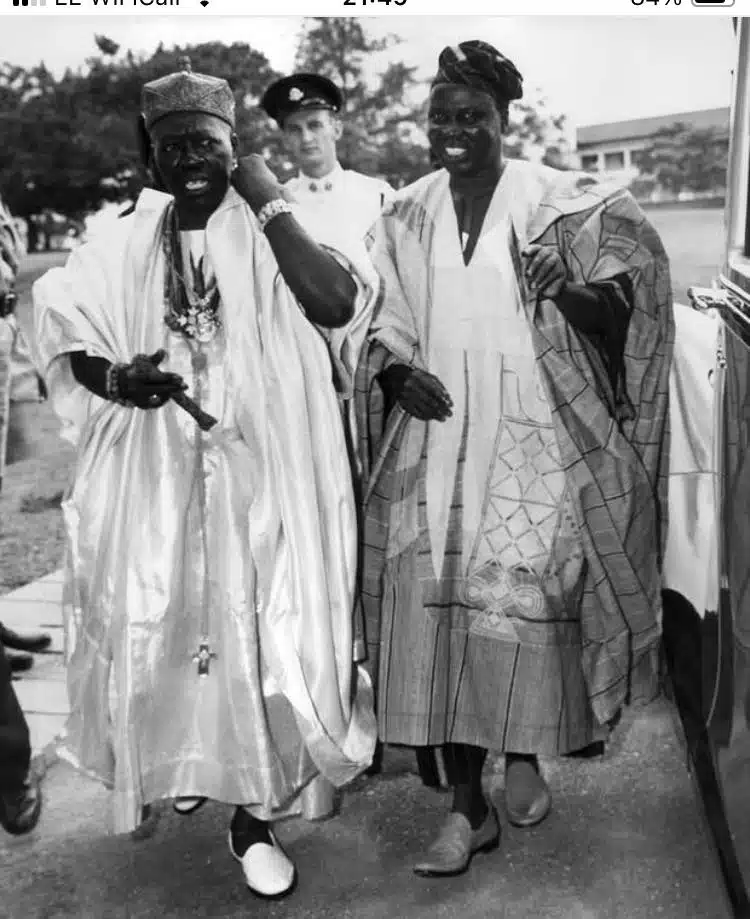
It is a well-known fact that he was a first-rate and forthright journalist who used his pen to arouse public awareness and interest on diverse issues and also mobilized Nigerians in the struggle for international independence.
He was once charged with sedition on the columns he was alleged to have written for his newspaper and talks he gave to students.
When he joined Egbe Omo Oduduwa which metamorphosed into Action Group (AG) 1950-1952, he became the first legal adviser for the Action Group who combined the use of his pen and speech to promote and defend his personal and political party’s fortune.
His Oratory skill in English and proficiency in Yorùbá mastery were unparalleled and became an “envoy-extraordinary” of the Action Group.
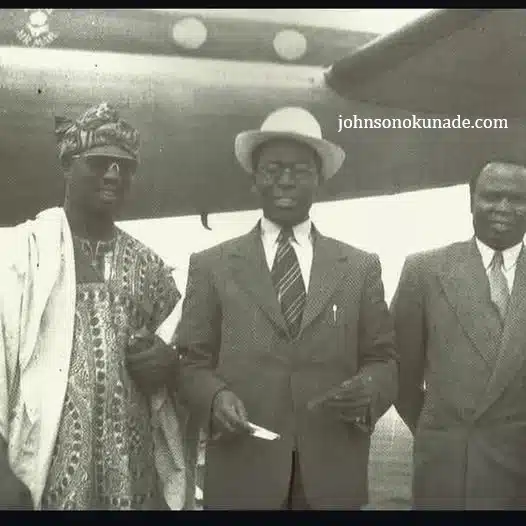
There is no doubt the combination of Awolowo’s Management abilities and Akintola’s oratory skills made Action Group the best and well organized political party in Nigeria at independence in 1960.
The story is said and no one has disputed it, that in his limelight days, no political party rally would be complete without, SLA making his last remark to dispense the gathering.
Between 1954 – 1959, Samuel Ladoke Akintola (SLA) became Deputy Premier and Premier of the Western Region of Nigeria in the immediate post-independence era (1960 – January 1966).
Samuel Ladoke Akintola (SLA) was made Asipa of Ògbómòsó by Oba Olatunji Eleepo in 1954 and Ajala Agbe, as he was fondly called by Ògbómòsó people, became the 13th Aare Ona Kakanfo of the Yorùbá (The Generalissimo or Military Field Marshall) without fighting anyway; the first to hold the title in the 20th Century.
Chief Obafemi Awolowo and Chief Samuel Ladoke Akintola

Prince Solomon Iyiola Olabisi, a retired police officer of well over thirty years now, in one of his interviews recently made bold to say without mincing words that “without Akintola, Awolowo would not have succeeded in his bid for political leadership in the west.”
He concluded by saying: “without Akintola there would not be an Awolowo”
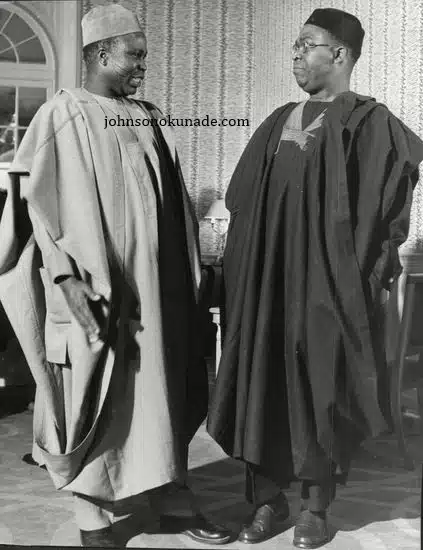
Samuel Ladoke Akintola’s son, Late Victor Ladipupo Akintola, in one of the interviews granted, said his father was one of the Greatest Nigerians ever lived, and summed up the whole description in the following paragraph:
“Samuel Ladoke Akintola (SLA) excelled in virtually all positions and posts he held from being a worker of the Nigerian Baptist Convention, a newspaperman, a parliamentary, a leader of the opposition, and even when he was Premier of Western Nigeria. As a journalist he was behind the expulsion of a white man who called a Nigerian a monkey, as a parliamentarian, he moved the independence motion. He equally saw to the establishment of Islamic studies in the University of Ibadan.”
What a great man he was!
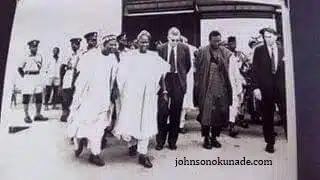
Alfred Knight, an American-based progressive Yoruba enthusiast also wrote: “Chief Akintola never betrayed anybody not to talk of the Yoruba nation. He stood his ground when the situation called for it. For every portfolio he was assigned, he excelled outstandingly. Chief Akintola made us know that no man is an island. He made us know that the political success of the old Western Region rested not on one man alone. It was on collective responsibility.
For example, the “free education”, was not the brainwork of Awo. A minister from Ijebu-Igbo proposed it at the cabinet meeting, sold it to the party, and it was implemented. But today, everybody talks as if it was Awolowo’s idea. When Chief Akintola was Minister of Education, he made sure University College Ibadan ranked amongst its equals. When he was health Minister and the University College Hospital was established, he made sure that all the facilities were fully established and met world standards at that time. Tell me, have there been any addition to UCH since then?
If not for Chief Akintola, Cocoa House, Investment House, Lapal House, Western House, and the Independent Building would have been called Dideolu Investment. It was only Chief Akintola who cried out. He insisted that those structures and others were built with proceeds from the Cocoa industry and therefore cannot be allotted to Awolowo’s family. Chief Akintola made sure that the University of Ife (Now Obafemi Awolowo University) took off (Even though it was Chief Obafemi Awolowo’s idea), he signed it into law during his administration as the Premier (you can read this from the history of the university).
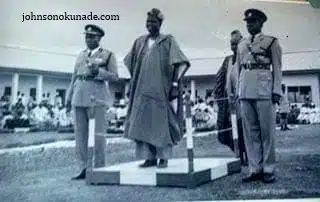
Alfred Knight concluded by saying: Akintola’s legacy but his truth has continued to speak for him. Chief Akintola prior to politics, was a profound journalist, lawyer, and a Commerce graduate. His son was the first Nigerian to go to Eton College in London. He was a true Aare-Ona kakanfo and was never afraid of death. He laid down his life for the Yorubas but the politics of those days took everything away from him”
Samuel Ladoke Akintola (SLA), it is said, was the facilitator for the mass acceptance of the party in the West because of his proficiency and oratory prowess which till today has not been matched by any Nigeria. He was a leading light to the performance of the Action Group party in his days.
History is written only by the survivors, not by the dead, and Just like Chinua Achebe said; “until lions have their own historians, history of the hunting written by the children of hunters will always glorify the hunters”
If Samuel Ladoke Akintola (SLA) was given long life as his contemporaries and his life was not prematurely terminated and survived the first Nigeria Military coup, it is most likely the story might not be as some of his detractors today portray him or even want to obliterate his achievements from the annals of Nigeria political history.
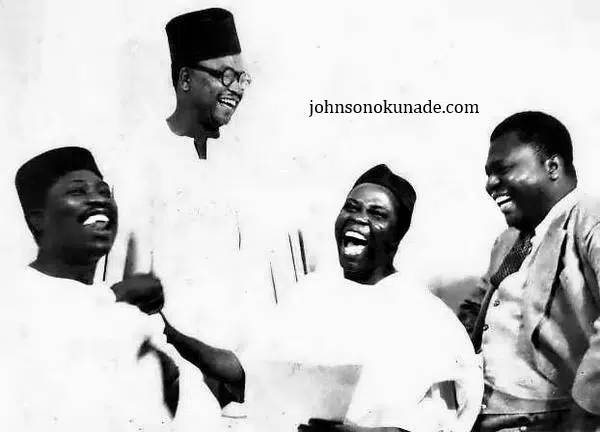
When it comes to the historical accounts of Samuel Ladoke Akintola (SLA), the problem is that many writers and commentators in recent past and present including some politicians are mostly being carried off the track because of selfish partisanship and self-prejudice or cheap popularity or a combination of all.
Akintola, the Premier of the Old Western region was a courageous man that deserved to be acknowledged and celebrated by every well-meaning Yorubas in Nigeria.
His intrepidity earned him the title of Aare-Ona-Kakanfo “Generalissimo” of Yoruba land. He was never an accident in our history, but a titan that should be well-acknowledged.
It’s irrelevant to dabble or engage in the feud which engulfed the two Political gladiators of the first republic but there is a need to put records in proper and real perspective and correct the drift and insincerity on the part of those concerned.
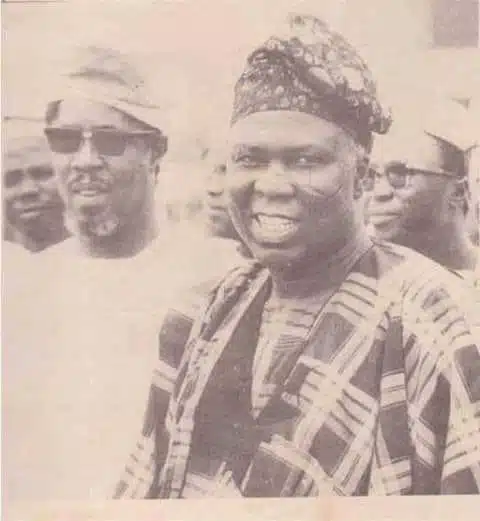
What I’m saying is that it is very pertinent and proper to bring to light the public knowledge in brief what brought about the clash or in-fighting between Chief Obafemi who was, in fact, the party leader, the first Premier of Western Region between 1954-1959, friend and colleague to Samuel Ladoke Akintola (SLA).
It suffices to say that the University of Ife (now Obafemi Awolowo University ) sited in Ife during Samuel Ladoke Akintola’s premiership and he inaugurated the governing council and was the first Chancellor of the University.
It’s no secret that Samuel Ladoke Akintola (SLA) insisted that the University must be situated at Ile-Ife. He argued that Ile-Ife is the source of the Yorùbás so it’s proper and befitting that the university is sited in Ile-Ife.
It is the Irony of history that the University of Ife (now Obafemi Awolowo University) belatedly honoured him with the Hall of Residence twenty years after his death.
He was equally the founder of the defunct Daily Sketch Newspaper amongst others and records are there.
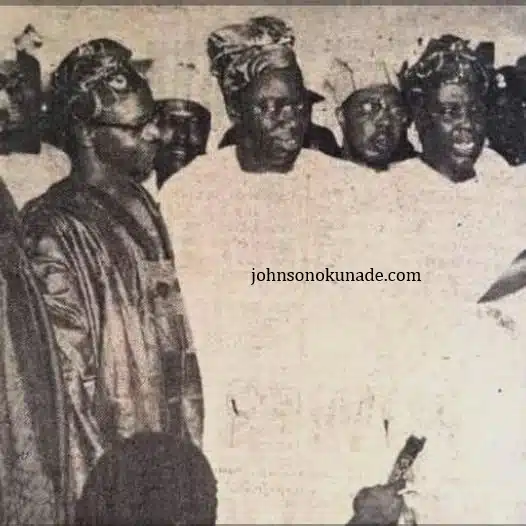
In 1937, Nnamdi Azikwe started West African Pilot Newspaper. Zik was using the newspaper to promote only the Igbo Stock. Dr. Festus Adedayo said: when you’ll pick a copy of the West African Pilot and see the heading of an Igbo man that just came back to Nigeria with B.A. The newspaper was mainly by the Igbo and for the Igbo.
So because of this, in 1949, the Egbe Omo Oduduwa wasn’t okay with this, they needed to also have their own voice so it was decided that the tribune should be founded and of which Chief Obafemi Awolowo spearheaded it. With the cooperation of the then Yorùbá leaders such as Oba Adesoji Aderemi, the Ooni of Ife, the newspaper also started promoting the Yorùbás and was used as a political/ideological weapon by Chief Obafemi Awolowo. In all the political wars that were fought at the time, the Tribune newspaper was at the centre of it.
When the feud between Chief Obafemi Awolowo and Chief Ladoke Akintola started, the media was Chief Obafemi Awolowo’s choicest weapon with the tribune at the tip of his finger.
Even though Chief Samuel Ladoke Akintola was a journalist, in fact, he was the editor of the Daily Service before he became the premier. His fierce and great articles at the Daily Service were widely accepted and his fans started calling him SLA.
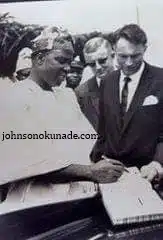
It should be known, Akintola was never a pupil to Awolowo, they were both matured men with legal and political experience when they formed Action Group in 1950, different ideas culminated, and Awolowo was chosen as the leader of AG while Akintola replaced Bode Thomas as the Deputy leader of AG after his death in 1953.
In fact, the position that Awolowo occupied after independence, Minority Leader of the opposition in the National Legislative Council, Akintola was once an occupier in the 1950s while Awolowo was the Premier of Western Region in 1954.
Because Chief Awolowo wanted power at the federal level, he felt he must take Akintola’s position while Chief Akintola should step down to the regional level as the premier so he can achieve his ambition. This made them swap positions and to set the record straight, Chief Akintola was also Chief Awolowo’s deputy; becoming the premier was his right. The Premier, Chief Awolowo willingly resigned as the premier for his “bigger” ambition.
Summarizing the underlying factors that led to the crises between Chief Awolowo and Chief Akintola, the latter said he kept quiet for a long time hoping the chiefs and elders of the party should be given the fullest opportunity to settle the rift. He said he eventually broke his silence when the matter had snowballed into a political crisis.
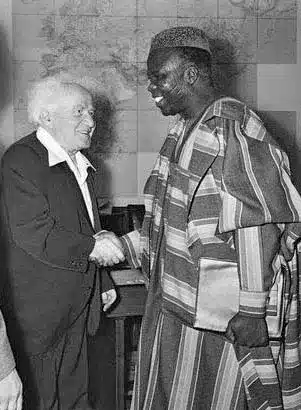
According to chief S.L Akintola, from the beginning, Chief Obafemi Awolowo disapproved of his becoming the Premier, and he only succumbed to pressure because he had no other choice, secondly, the then Action Group controlled the press from day one of his administration never supported his government or say anything good of his ministers, of which he was the head of government. Chief Awolowo wanted to dictate everything or to run the government from the outside.
Also recall that before becoming second in command to Chief Obafemi Awolowo in the party, Samuel Ladoke Akintola (SLA) was the first Federal (Central) Minister Of Labour (1952), the first Federal (Central) Minister Of Health and Social Welfare, and the very first Minister Of Communication and Aviation, all at National level.
The Nigerian House of Representatives sitting in Lagos in August 1952 passed an Ordinance the UCH Ordinance which established a University College Hospital for the University College Ibadan.
Funds were released by the Federal (Central) government through the persuasive, persistent, and witty efforts of the then Central Minister of Health and Social Welfare, Chief Samuel Ladoke Akintola; SLA was the one that made it possible for us to have UCH Ibadan, till date.

Samuel Ladoke Akintola (SLA) came down to the Western Region but Chief Obafemi Awolowo wanted every minor and major or even detail of Akintola’s government policy decision must pass through him.
Chief Samuel Ladoke Akintola (SLA) emphatically said they fell apart when Chief Awolowo continued to request that he (Akintola) should put government funds in certain private accounts, particularly the National Investment Property Company (NIPC) which Akintola said was contributing nothing or no positive impact in the economy of the region.
The other major offense leveled at Samuel Ladoke Akintola (SLA) was his attempt to form a national or coalition Government. This step to those opposed to Akintola’s moves means Akintola was trying to sell the Yorùbá to the Hausas.
Alas! A big credit should, however, be given to Akintola for his foresightedness and sharp intelligence to forecast or the vision to see that in a federal system like Nigeria, with diversity in ethnicity, cultural and religious differences, the only way out is to ally, cooperate and fraternize with others in the system- for his Yorùbá people to benefit.
It was said that Samuel Ladoke Akintola (SLA) mentioned to people that “no man is an island”. He also went ahead to say: “You all know I only gave birth to 5 children, also Chief Obafemi Awolowo also gave birth to 5 children, unlike the Hausas. A Hausa man can have up to 20 children, with that alliance, we can achieve more”
It’s important to note that up to date, the vote from the North determines who will become president. We need them in our corner more than they need us in theirs, no matter how bad we think they are. Except we align with them, get to power and break free to create Oduduwa republic, the North determines who will become president in Nigeria because of their population.
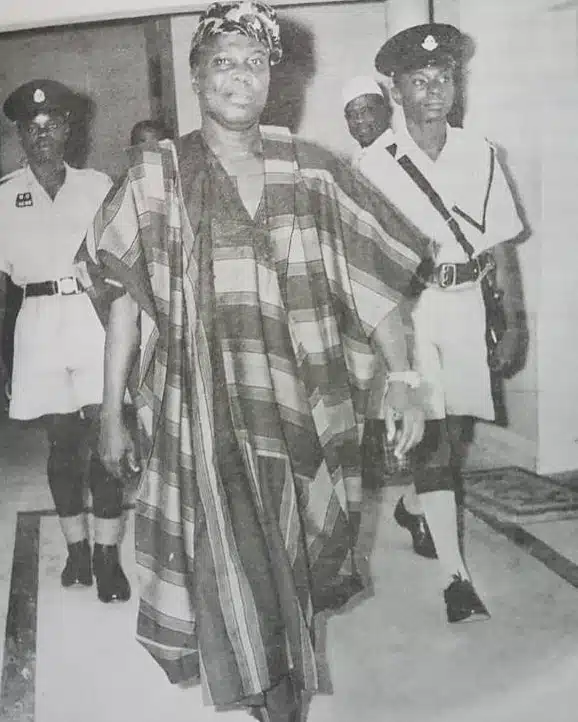
Besides, they take the civic duty of voting more seriously than all of us in the west. It’s only big grammar and vocabulary we know, despite the fact that our number is small, not all of us perform our civic duty of voting.
It is good news that after 65 years of independence in Nigeria and 59 years after the demise of Akintola from the political scene, Nigerians and the country at large is still struggling, and grappling with one another and with one problem of survival or the other, hoping for unity and oneness in a country amalgamated together 111 years back.
What Chief Samuel Ladoke Akintola (SLA) envisioned and fought for, remains Nigeria’s problem today.
It seems clear that no part of the country or ethnic bloc or group within the system, ever since political independence has been able to go alone without the support and cooperation of other groups within the federal system.
This early discovery was the “unpardonable” sin (Sir) Chief (hon.) Lawyer, Samuel Ladoke Akintola (GCON) “committed” against his people.
In an interview with The Punch newspaper on 30th November 2013, Dr. Omololu Olunloyo, a great nationalist, a two-time former Commissioner of Education of the old Western Region, a former Governor of Oyo state, one of our few remaining elder statesmen and a man that played a prominent role in the politics of both the First and Second republics said the following-
“Chief S.L. Akintola was the supreme leader. Chief Obafemi Awolowo left (the Premiership of the Western Region) of his own volition without advice to contest the federal election. In the federal election, he contested but he had no alliances. The stubborn, aggressive, very hardworking, visionary leader that Awolowo was, he never understood real politics at any time. In real politics you have to look at the figures, you have to have allies- there are no permanent friends or permanent enemies. You must have some allies. Nigeria is too fragmented for you not to have allies. If you are counting in the presence of someone with nine fingers, you don’t count in the person’s presence and say ‘so you have nine fingers’. We had a brilliant man called S.L. Akintola who understood real politics. Awolowo believed that book knowledge was so important but he (Akintola) knew better. A situation arose- Awolowo wanted to ally with the east and Akintola wanted to align with the north. So there was a crisis”.
Some of the Achievements of Samuel Ladoke Akintola
On his social relation network, one of his sons, Chief Abayomi Akintola said, he loved us and loved our friends. He did not use his position to our advantage. He used his position for the common good.
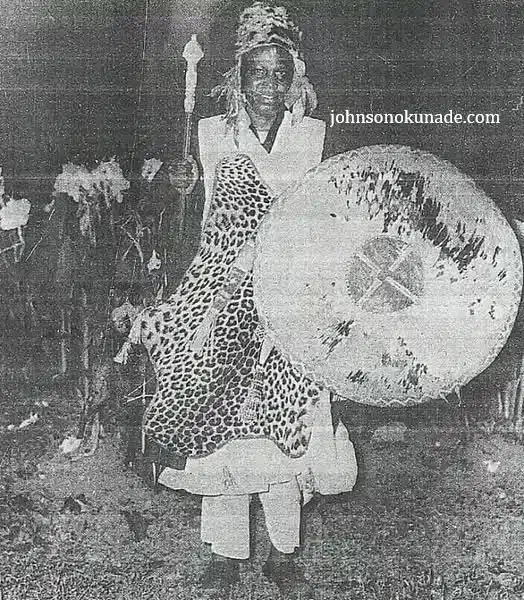
Chief Samuel Ladoke Akintola was a linguist and a detribalized, great Nigeria, who spoke English, Hausa, Nupe, and his Native Yorùbá Language fluently and eloquently without arrogance.
It is said he was a social egalitarian who matched his words with action. For instance, he used to sit, drink or eat at the same table with his aides and drivers.
Chief Samuel Ladoke Akintola contributed to the growth and development of Education in Ogbomoso and the western region immensely.
With the Late Professor N.D Oyerinde, he was the moving spirit to the establishment of Ògbómòsó Grammar School And Ògbómòsó Girl’s High School.
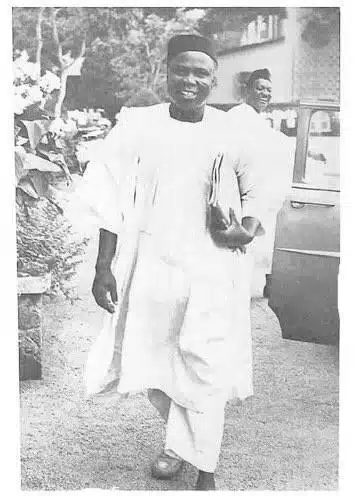
Chief Samuel Ladoke Akintola (SLA) provided water and electricity for the upkeep of the two schools, he also single-handedly built an Assembly hall for Ògbómòsó Girl’s High School.
Other laudable achievements credited to SLA included a mass intra-city road network carried out between 1953-1957 through communal efforts spearheaded by him.
Interestingly as a good example, it is said that part of his father, Akinbola’s house at Laka/Jagun, Ògbómòsó was First demolished to give way to the road construction.
What an example of a good democrat!
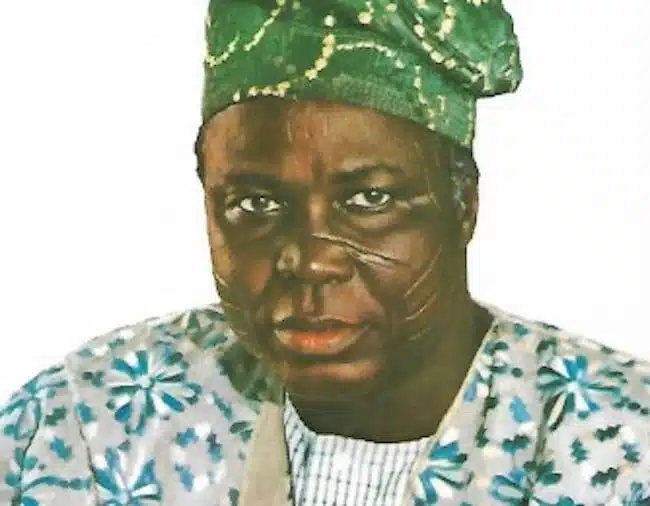
In his hometown, Ògbómòsó, the Rediffusion radio service of 1955 was installed at Okelerin Junction of the town. Similarly, the new General Hospital came into being in 1957.
He made sure new electricity was installed in Ògbómòsó in 1961 and a new town hall built during his period is still standing to date as a monumental edifice now called Soun Ogunlola hall, and a new Ògbómòsó waterworks Dam on (Oba River) was put to use in 1964.
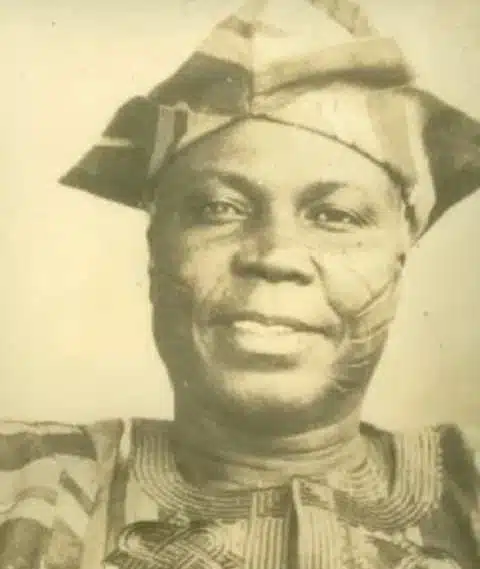
From all that has been said, Chief Samuel Ladoke Akintola was a man with a large heart and with robust monumental achievements, not only in his immediate community, Ògbómòsó, where he hailed from but for the whole country, Nigeria.
He was among the leading torchbearers and nationalists in Nigeria’s history. He was equally among the front-liners who fought for the independence of Nigeria and was awarded the prestigious national award of Grand Commander of the Order of Niger (GCON).
How Samuel Ladoke Akintola Died
Chief (Hon.) Lawyer, Samuel Ladoke Akintola (GCON) the last Premier of the Western Region and the 13th Generalissimo Of Yorùbá Military Marshall was aware of the plan for the January 15, 1966 coup.
Having heard of the coup, he went to brief Sardauna of Sokoto (Premier of Northern Nigeria) and the former having briefed Tafawa Balewa, the then Prime Minister Of Nigeria, who ignored it with a wave of the hand by saying it was a mere rumour.
It was shortly thereafter the said coup was executed and the three were killed.
Though Akintola was killed in the hallway of his official residence as Premier of the Western Region, true to his military post of Aare Ona Kakanfo, he had a fierce battle with his killers and witnesses said the kakanfo was invincible.
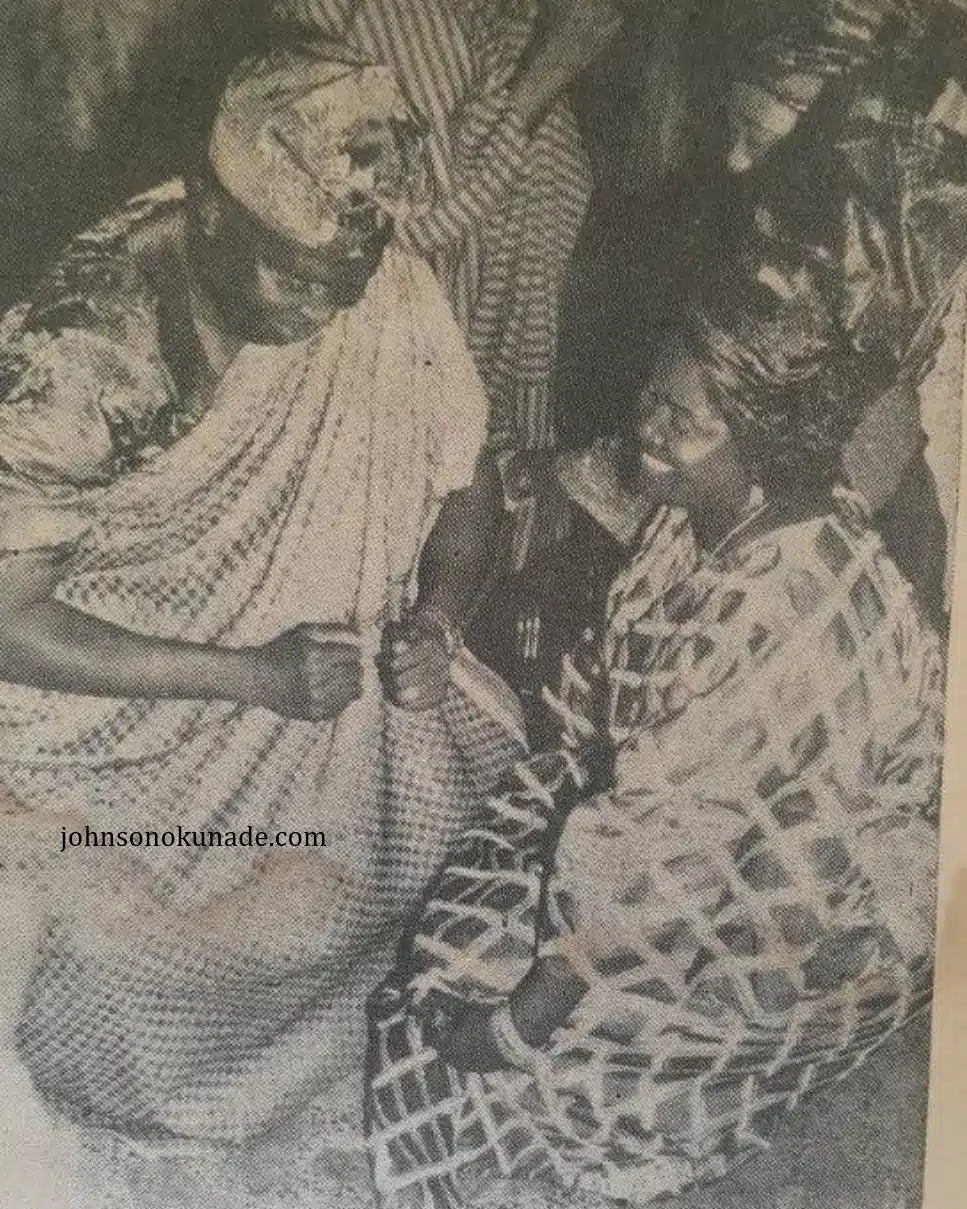
His killers decided to start killing his aids, and workers and threatened to kill his children if he keeps giving them a tough time and to show the world his selflessness even though he could have defeated them or escaped. the Kakanfo faced his killers like the brave Spartan that he was just to save those around him.
The then Commissioner of Police, Chief Odofin Bello instructed his deputy, Olufenwa to get a load of mobile police units ready to accompany the late body of Chief Samuel Ladoke Akintola, SLA prepared at Adeoye Hospital to Ogbomoso his home town for the final journey.
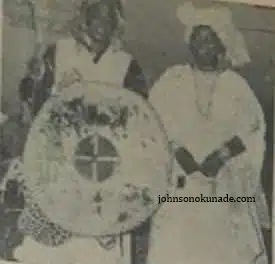
His body was conveyed to Ògbómòsó by S. Ade Ojo, Mr (Later Chief) Lekan Salami, Mr. Agboola Ajao, and his younger brother Chief Adigun Akintola at 3 a.m on January 23, 1966, and got to Ògbómòsó at about 5 a.m.
In Ògbómòsó, others who saw and witnessed the final burial were Reverend S.A. Ige, Chief J. Ola Adigun, Chief Ogunniyi and Onpetu Ijeru, Oba Oladeji Atoyebi as there was no Soun in the throne, and by 6:30 a.m the burial was completed before news filtered around the town of the final rites.
May His Soul Rest In Peace!
The Legacy of Samuel Ladoke Akintola
Chief Akintola was survived by his wife Chief Faderera Akintola (now late), his children Chief Abayomi Akintola, Dr. Abimbola Akintola (a medical doctor), and Mr. Ladipo Akintola an accountant of note and an accomplished author who died a few years back.
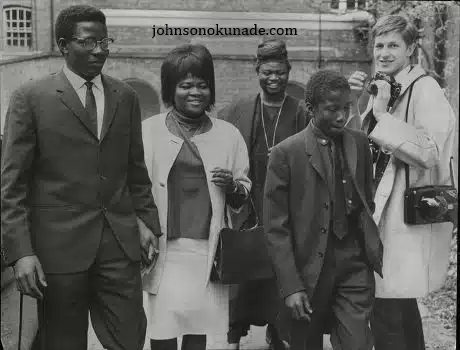
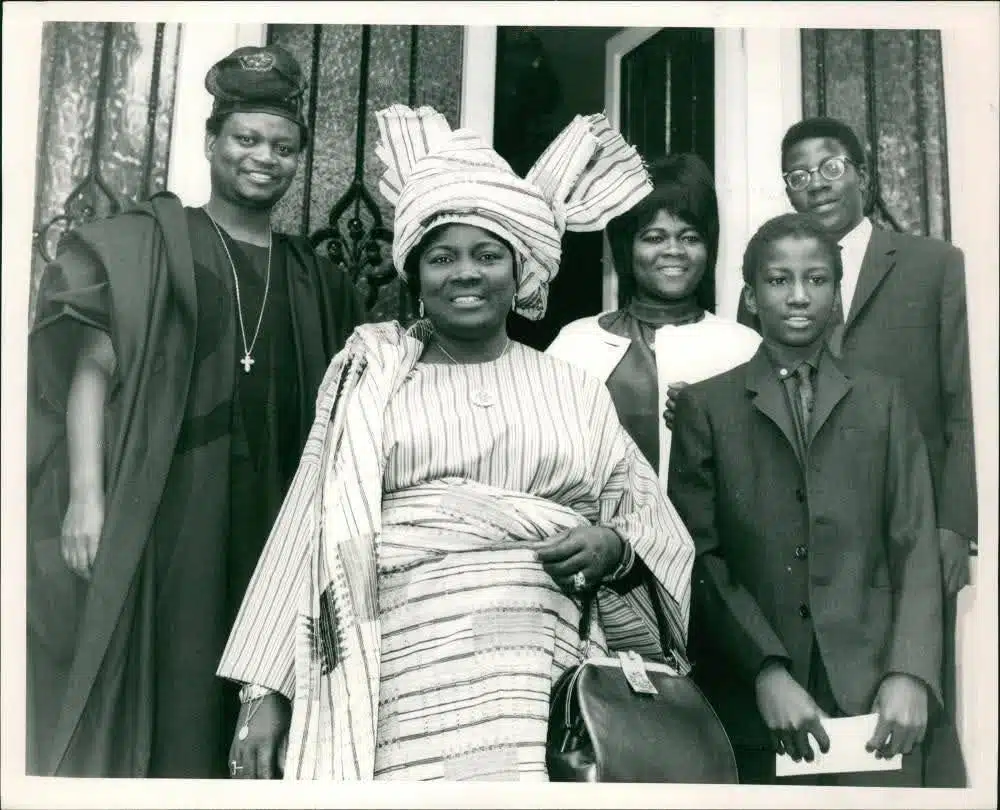
Although Chief Ladoke Akintola gave birth to five children, the three mentioned above survived him. Omodele Akintola, the first child of the family, died in 1965, Tokunbo died in 1973, and Oladipupo Akintola is also dead.
Before winding up on this biographical dossier, the life and times of Chief Samuel Ladoke Akintola, an enigma and unmatched charismatic leader, Ògbómòsó has ever produced since the making of Nigeria’s nation-state, it is appropriate to recall and document that Chief Abayomi Akintola his son was elected by Ògbómòsó, into House Representatives in the Second Republic in 1979 under National Party Of Nigeria (NPN) but later took up the ministerial appointment as Minister of State for Finance under Alhaji Shehu Shagari administration.
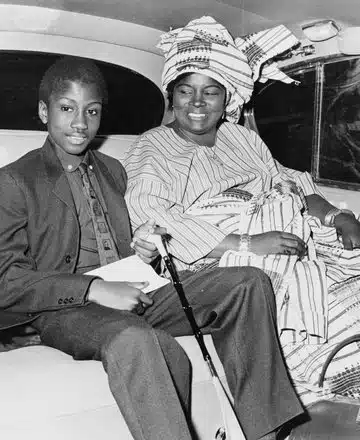
It is also noted that Chief Abayomi Akintola was also made an ambassador to the Republic of Hungary during President Olusegun Obasanjo as a civilian president in the Third Republic 1999-2003.
Another surviving daughter Dr. Abimbola Akintola a medical doctor, the younger sister to Chief Abayomi Akintola was also a federal Minister, under Alhaji Shehu Shagari second coming to power for three months before the government was toppled by another military putsch of December 31, 1983.
Ladoke Akintola University of Technology (LAUTECH), Ogbomoso
The conception of the University began in 1987 when Governor Adetunji Olurin, the then Military Governor of Oyo State, responding to a letter from the Governing Council of the Polytechnic Ibadan set up a seven-member inter-ministerial committee under the chairperson of Mrs. Oyinkan Ayoola.
The Committee submitted its report in 1988 and recommended the establishment of a State University.
In response to their submission, a 15-member committee of distinguished academicians under the chairmanship of Professor J. A. Akinpelu was inaugurated to further deliberate on the matter.
The committee again retained the earlier verdict of the necessity for a new University in the then Oyo State. Several other committees, notably that of the Archdeacon (Dr) E. O. Alayande also deliberated on the viability of an Oyo State University.
Then in October 1989, an inter-ministerial committee set up by the Governor, Col. Sasaenia Adedeji Oresanya under the Chairperson of Mrs. Lydia Oyewumi Abimbola the State Commissioner for Education by then, conclusively approved the idea and launched the Higher Education Development Appeal Fund of the University.
A total Sum of N19m was realized in both cash and pledges from the launching ceremonies conducted in the State Capital and in the 42 Local Government Areas of the State.
Bashorun M.K.O. Abiola (succeeded SLA as kakanfo) who was the chief launcher, donated a total sum of N2.05 million.
On the 9th of February 1990, the Abimbola Administerial committee established a Technical Committee of distinguished Academics chaired by Prof. (Chief) E. A. Tugbiyele to formulate the blueprint for the infrastructure and administration of the new University.
The committee submitted its report, on 12th April 1990, to the Government which approved it immediately. On 13th March 1990, the Federal Military Government acceded to the State’s request to set up the new University.
Col. Oresanya later signed the Edict Establishing the University on 23rd April 1990. He also announced on 2nd May 1990 the Appointment of Professor Olusegun Ladimeji Oke, a distinguished Chemist and a Fellow of the Academy of Science (FAS) as the first Vice-Chancellor of the University.
In addition, the names of the Pro-Chancellor, Prof. Ojetunji Aboyade, and other members of the first Governing Council were announced on 28th May 1990, and Col. Sasaenia Oresanya himself became the foundation Visitor to the University.
Later Bashorun M.K.O. Abiola became the first Chancellor in January 1991 with the approval of the succeeding visitor, Col. Abdulkareem Adisa.
The first meeting of the University Governing Council was held on 7th June 1990, the first Senate meeting was convened on 13th February 1991, and the first Academic session began on 19th October 1990 with a total number of 436 candidates offered admission to various courses in four faculties namely Agricultural Sciences, Environmental Sciences, Engineering and Management Sciences, and Pure and Applied Sciences.
The establishment of the College of Health Sciences was postponed for a year and later took effect in October 1991 with a student population of thirty (30).
Arising from the creation of Osun State from the former Oyo State, the name of the University was changed from the Oyo State University of Technology to Ladoke Akintola University of Technology, Ogbomoso and the Edict that established the University was appropriately amended.
A great man he was.
SLA left the world better than he met it, that is his Legacy!
A Call to Preserve the True Legacy of Chief S. L. Akintola
Over the years, some remarkable authors have done a fantastic job of preserving the memory and good deeds of Chief Samuel Ladoke Akintola. Among them are
- Akintola: The Man and the Legend by Victor Ladipo Akintola,
- Samuel Ladoke Akintola: In the Eyes of History by Hon. Femi Kehinde,
- S. L. Akintola: His Life and Times by Prof. Akinjide Osuntokun, and
- S. L. Akintola: His Politics and His Nation – The Reminiscence of One of His Associates by S. A. Tinubu.
These works have helped to paint a clearer picture of who Chief Akintola truly was, correcting many of the misconceptions that have followed his name over the years.
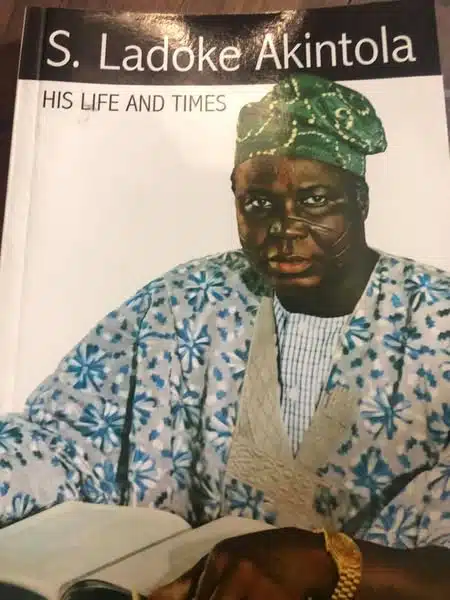
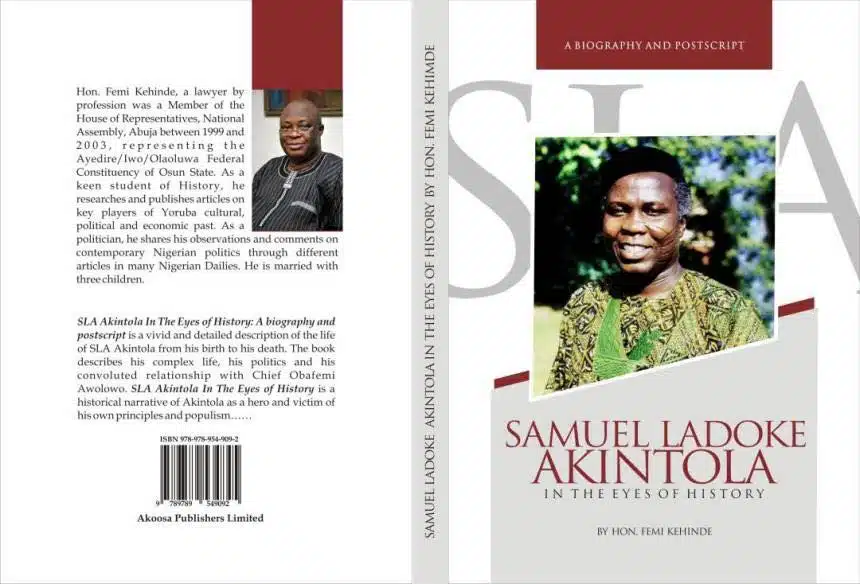
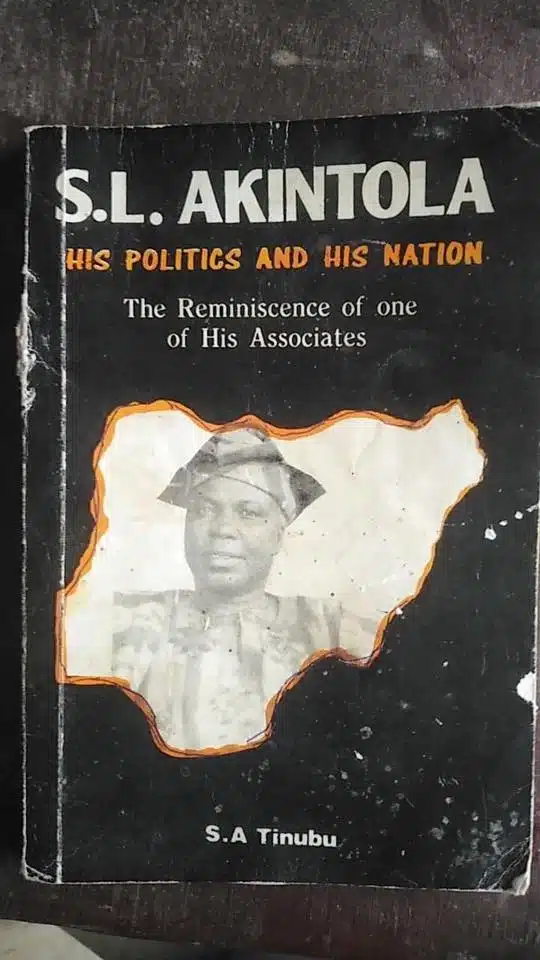
It is a known fact that because of the great love and admiration many people have for Chief Obafemi Awolowo, the roles and impact of Chief Akintola in Yoruba history are often downplayed. Yet, history is broad enough to accommodate and celebrate both men without diminishing either. They were both giants of their time, and each contributed immensely to the progress and identity of the Yoruba nation in different ways.
Chief Akintola was not blessed with the long life that might have allowed him to write books, defend himself, or tell his own story as Chief Awolowo did. But his works, vision, and sacrifices still speak for him. The roads he built, the schools he founded, the policies he championed, and the people he touched remain living testaments to his leadership and love for his people.
This is therefore an honest appeal to the Akintola family, the good people of Ogbomoso, and indeed to all sons and daughters of Yorubaland: let us not allow time or sentiment to erase the legacy of this great man. His story must continue to be told with truth, fairness, and pride. The name Samuel Ladoke Akintola deserves to be remembered, studied, and celebrated, for he was a man who gave his all in service to his people and to the unity of our beloved nation.
References
- UCH Ibadan Website; https://uch-ibadan.org.ng
- Wikipedia
- Media Reports Projects, Chief The Honourable S.L Akintola GCON, Premier Western Nigeria (1960-1966) selected speeches, “Let God, History and Posterity Judge” Edited by Yemi Adedokun
- We Should be Kind to History, Samuel Ladoke Akintola Betrayed Nobody written by By Ogunwoye Gbemiga Samson published on National Insight
- “Ògbómòsó in the Early Times Modern Era and in Today’s Contemporary World” Written by Chief Oyebisi Okewuyi (Page 99-103) Published by Johnny Printing Works
- A discussion with Pa Rev. Ogunleye on December 2019
The BEST way to support us is by providing funding to enable us continue this good work:
Bank: Guarantee Trust Bank (GTBank)
Account Name: Johnson Okunade
Naira Account: 0802091793
Dollar Account: 0802091803
Pounds Account: 0802091810
Euro Account: 0802091827
Business Email — hello@johnsonokunade.com

